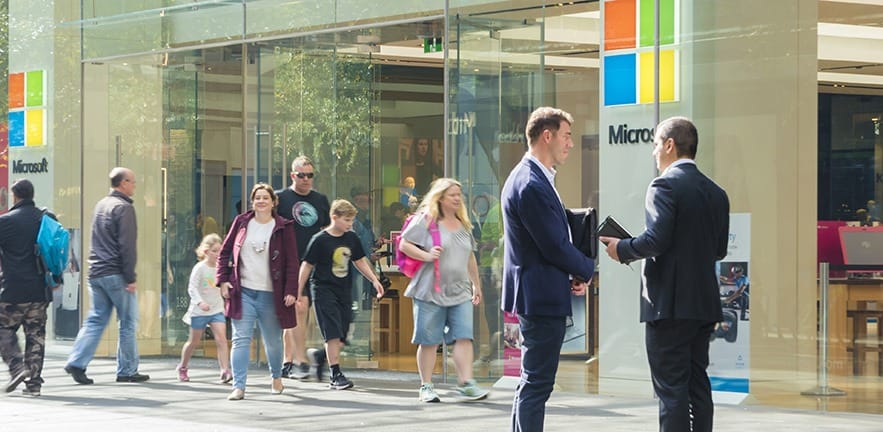As Microsoft surfs the waves of culture change instigated by a visionary new CEO, what’s working at the tech giant like for a Cambridge MBA set to become one of the company’s future leaders?

Ruchika Raj (MBA 2016) is very clear about what gets her up on the morning excited about her role as a B2B Product Marketing Manager for Microsoft:

“Being able to help our customers. Everything is becoming digital and it is impacting every industry. Our customers want to be able to use tech to be better at what they do. So being in a place where you can help these companies revolutionise themselves is exciting. We get to impact millions of people through the products we work on and the businesses which use them to help their customers.”
It’s a vision that you feel would meet with approval from CEO Satya Nadella whose stated aim for the company is ‘to empower every person and every organisation on the planet to achieve more’. Nadella is on a mission to lead the Microsoft monolith away from the single-minded, practical goal of a PC in every home towards a broader cultural shift, which aims to empower Microsoft people to be fearless in innovating, and driven by developing products that solve real world problems and improve lives.
Ruchika joined Microsoft straight from her MBA. In her London-based role within the business strategy, Windows and Devices group for Microsoft, she works with sales people, peers, partners and the Marcomms team, to execute strategy and deliver customer service. Microsoft was her first choice of post-MBA employer:
“I’m from a tech background, I worked for Redgate in Cambridge pre-MBA, and wanted to stay in tech but in a role where I could learn about enterprise and B2B selling with a company that was mature in these and was also moving rapidly into new spheres. Microsoft is fast changing under the new CEO – there is a lot of momentum and exciting change happening with the new strategy focusing on AI and the Cloud. It’s a fascinating time to be working here.”
Ruchika started off working on an incubation project before moving to product marketing. Her role allows her wide exposure across the company:
“The exposure you get to being able to work in different teams – the security team, the services team and field teams – is great. You learn a lot very rapidly. There are many virtual teams so you get a great breadth of understanding of how the business works. A lot of people build long-term careers here and the opportunities are very good. You can move roles easily and that means you are always learning. The company is flexible with employees – they will support you in taking time off for volunteering and they invest heavily in your development.”
That development starts for a newly recruited MBA – onboarded through the MACH programme – when they are sent to the Seattle HQ for corporate training, joining all 250 MACH MBAs for insight into company strategy and the future vision, and a chance to network:
“One of the biggest benefits is the network you build – after that initial corporate training we will know someone in over 80 global locations and that is a fantastic benefit.”
MACH MBAs build a development plan for their path two or three years into the company. They are encouraged to engage with senior figures in the company and can have as many mentors as they like. Ruchika’s plan is set to take her in a new direction when she is ready:
“I envisage taking on a more client facing role down the line as our customers are what really interest and inspire me. The opportunities are huge. I can move to different geographies and have multiple mentors. As leaders of the future within the company, we are given a very responsible role from the beginning and you work directly with senior people. It is great experience and training.”
So what kind of MBAs does the company want to attract? Melissa Del Castillo, who recruits for the MACH MBA explains that the guiding principle is very simple:
“We want people who are constantly thinking of others. We want smart people but we want them to have an appreciation of helping others. We also look for a ‘growth mind-set’. That is something articulated by the CEO as being of prime importance in our culture and it means people having the ability to think differently, be curious and never stop learning. We want to see that they have it, understand it and that they have already been applying it in their lives. We ask candidates to demonstrate this through their approach to challenges they have faced and give examples of how they have helped others to learn and grow.”
Being able to work effectively with others while keeping the focus on the customer is another key trait sought in an MBA:
“Microsoft is very large so one of the things we look for is an ability to collaborate. The ability to work well with others and influence in many key spheres of the company is crucial. A focus on customers – thinking from their perspective and constantly working to understand what they want and give value to them – these are also very important features we look for in an MBA
“We have started to work with Cambridge with more frequency in the last few years. We find the Cambridge MBAs very diverse in terms of career background and nationality and they come across as humble, curious and eager to learn. That fits right into our culture.”
Diversity is another big commitment for the company, which looks for
MBA candidates who are from as wide a background as possible.
“They don’t have to have a tech background but we look for a sense of business acumen. Good backgrounds to have are customer service, sales, marketing, consulting. When they come for interview we look for the growth mind-set and for a passion and interest in technology and what it can do. In the second round they are sent off to the area they are interested in, such as sales, marketing or services – sometimes even the country they are interested in. At that point of the interview process it’s about – can they do the specific role?”
Once the MBA has started on the MACH path, they attend Microsoft’s Training Academy for online and onsite training on customer values, collaboration, customer focus, navigating a matrix organisation, working on business simulations. They are also offered training in soft skills such as storytelling and making sales pitches. Training is flexible and driven by them. Melissa comments:
“We are basically building an MBA class within the company which becomes our future leaders pipeline. We expect them to question things, challenge teams and challenge the status quo. We encourage people to switch areas and move around. You should expect to be constantly challenged in an industry that is moving so fast. Opportunities are available all over and you can grow into lots of areas and locations.”

